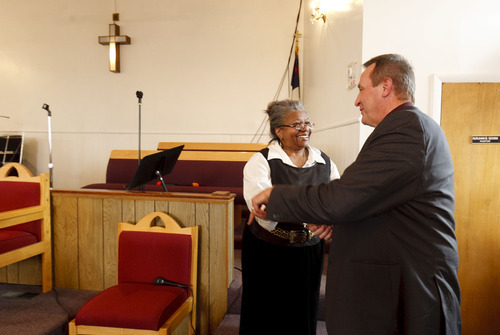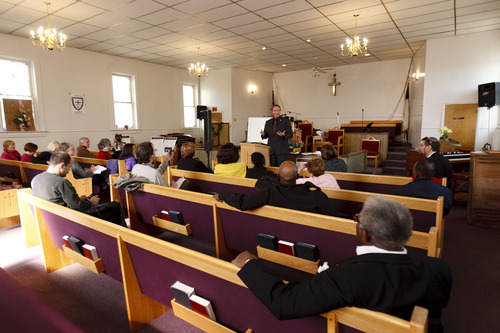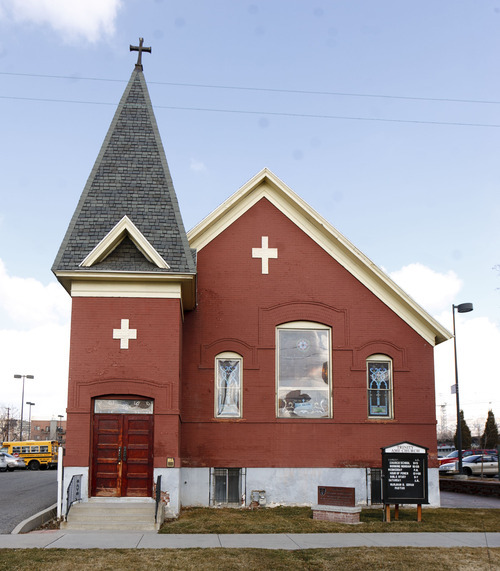This is an archived article that was published on sltrib.com in 2012, and information in the article may be outdated. It is provided only for personal research purposes and may not be reprinted.
As an assistant attorney general, Alan Bachman had to deny Trinity AME Church's claim against the state last year for water damage to its 104-year-old meetinghouse.
"Even as I did that, I felt haunted," Bachman recalled Tuesday. "I feel as if I were haunted by the spirit of Bishop Richard Allen," who founded the African Methodist Episcopal Church.
But as chairman of the Salt Lake Interfaith Roundtable, Bachman was able to make up for that denial. His group is helping with a campaign to not only repair the water damage, but also restore Utah's first black-founded church as a community jewel.
Bachman joined Trinity AME's pastor, Nurjhan Govan, and other dignitaries to kick off a fundraising drive for the building Tuesday, the 252nd anniversary of Allen's birth.
The building at 239 E. Martin Luther King Blvd. (600 South) was erected in 1907. Govan and James Green, a longtime church member, said it was the hub of Salt Lake City's black community.
Besides worship services and community dinners, the church staged meetings for various groups, including the NAACP and black Masons.
But water seeped through the basement walls. Eventually, church leaders had to shut down the kitchen and fellowship hall, which is named after Robert Earl Bourdeaux, father of former state Rep. Duane Bourdeaux. The closures deprived the church of an income source, and attendance has slipped to about 50 worshippers a week.
Members blamed the state for the water damage, pointing to runoff from the nearby Utah Board of Education building and snow piled up in its parking lot.
But a Utah Division of Water Resources study in September 2011 found unusually high water tables in the area and noted the church's basement walls were not waterproofed and that it lacked rain gutters and downspouts to carry away runoff.
Bachman said the fact that the church's claim came across his desk was a miracle of sorts, given his position with the Interfaith Roundtable. He pitched the idea of helping Trinity to the group and won unanimous approval.
At this point, a budget is still being drafted. Bachman said a "streamlined" project initially was pegged at about $500,000 to repair the church. But supporters decided to do more to restore the building, complete with a museum celebrating the church and AME's founder.
"As we have talked with community leaders," Bachman said. "They say, 'You know what? If we are going to put money into this, we want it to be the gem it really should be.' "
Govan said the roundtable's help will allow the congregation to bounce back and attract more families.
One of those pitching in is Bachman's boss, Utah Attorney General Mark Shurtleff.
"Today we're all pulling together to protect a wonderful landmark," Shurtleff said.
He donated a case full of signed copies of his book, Am I Not a Man? The Dred Scott Story, for the church to sell for $5 to $20 or more as a fundraiser, and vowed to bring more books when those are gone.
Twitter: @donaldwmeyers
facebook.com/donaldwmeyers —
How to contribute
P Donations can be made to the "AME Church Fund" at any Zions Bank. —
About the AME Church
The African Methodist Episcopal Church was founded by Richard Allen, a slave who bought his freedom.
Allen, who was born Feb. 14, 1760, began preaching in 1783. He purchased land for a church on 1791, which became the Mother Bethel Church, which is still in use in Philadelphia.
The church follows Methodist teachings, but is organized after the Episcopal Church.
Allen, according to Rochester Institute of Technology professor Richard Newman, believed that America would not fulfill its destiny until whites and blacks were equal.
"We can think of Richard Allen," Newman said, "as an 18th-century Martin Luther King."
Donald W. Meyers







